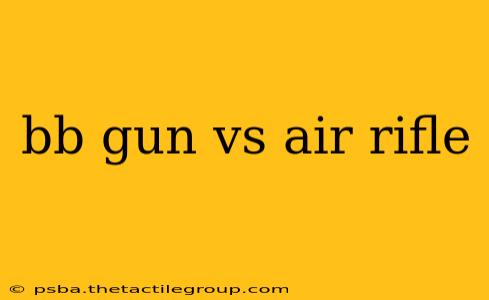Choosing between a BB gun and an air rifle can feel overwhelming, especially with the wide variety available. Both are popular for target practice, plinking, and pest control, but understanding their key differences is crucial for making the right choice. This comprehensive guide will break down the specifics, helping you decide which airgun best suits your needs and budget.
Understanding the Fundamentals: BB Guns vs. Air Rifles
The core distinction lies in the projectile: BB guns fire small, round steel BBs, while air rifles typically shoot more accurate and powerful pellets. This seemingly minor difference significantly impacts performance, accuracy, and overall shooting experience.
BB Guns: The Basics
- Projectile: Small, round steel BBs (typically 4.5mm).
- Power Source: Often spring-piston or CO2 powered. Some utilize less common power sources like pump-action.
- Accuracy: Generally lower accuracy compared to air rifles due to the BB's shape and lighter weight. Affected significantly by wind.
- Power: Lower muzzle velocity and energy compared to air rifles, resulting in shorter effective range.
- Cost: Generally less expensive to purchase and operate (BBs are cheaper than pellets).
- Maintenance: Typically less demanding maintenance compared to air rifles.
Air Rifles: A Closer Look
- Projectile: More aerodynamic pellets (typically also 4.5mm, but heavier and more diverse than BBs), offering superior accuracy and range.
- Power Source: Similar to BB guns, but often featuring more powerful spring-piston or gas ram mechanisms. Some are PCP (Pre-Charged Pneumatic) which offer higher consistency and shot counts.
- Accuracy: Higher accuracy due to the pellet's design and heavier weight, allowing for greater precision and less wind deflection.
- Power: Higher muzzle velocity and energy, leading to increased effective range and greater stopping power (important for pest control).
- Cost: Generally more expensive to purchase, and pellets are more costly than BBs.
- Maintenance: Can require slightly more regular maintenance, especially spring-piston models.
Key Factors to Consider When Choosing
Several factors should guide your decision beyond simply the projectile type:
1. Intended Use
- Target Practice: Air rifles generally offer better accuracy for serious target shooting. BB guns are suitable for casual plinking.
- Plinking: Both are viable options, but BB guns' lower cost makes them appealing for casual fun.
- Pest Control: Air rifles, with their greater power and accuracy, are much more effective for pest control. BB guns are generally inadequate.
- Hunting (small game): Air rifles (with appropriate power and pellet selection) can be used for small game hunting, but check local laws and regulations first. BB guns are not suitable.
2. Power and Range
Air rifles significantly outperform BB guns in both power and range. If you need more power and distance, an air rifle is the clear winner.
3. Accuracy and Precision
Accuracy is paramount for target shooting. Air rifles offer superior accuracy and consistency thanks to their heavier, more aerodynamic pellets.
4. Budget
BB guns are generally less expensive to purchase and operate. Air rifles, particularly PCP models, can be significantly more costly.
5. Maintenance
BB guns typically require less maintenance, while air rifles, especially spring-piston models, may need occasional lubrication and servicing.
Conclusion: The Right Choice for You
The "best" airgun depends entirely on your individual needs and preferences. BB guns provide an affordable and easy-to-use option for casual plinking and basic target practice. Air rifles, however, offer superior accuracy, power, and range, making them ideal for serious target shooters, hunters (of small game, where legal), and those needing effective pest control solutions. Carefully weigh these factors to make an informed decision that aligns with your specific requirements. Remember to always prioritize safety and adhere to all local laws and regulations concerning airgun ownership and use.

